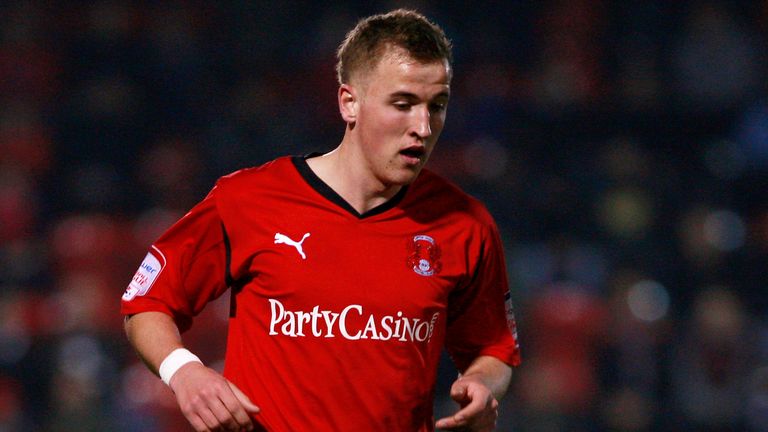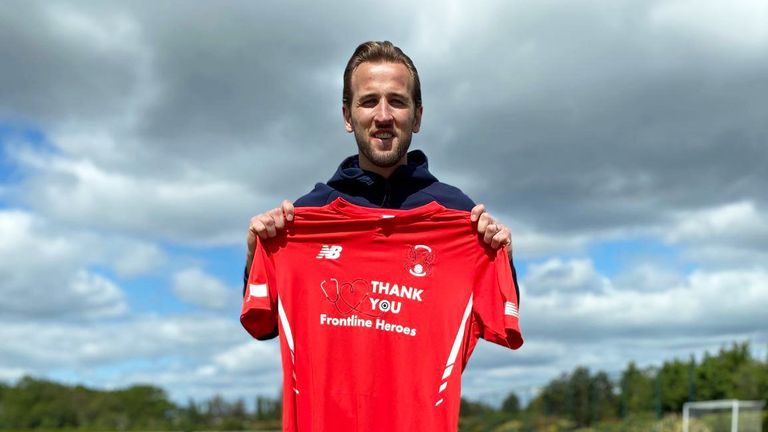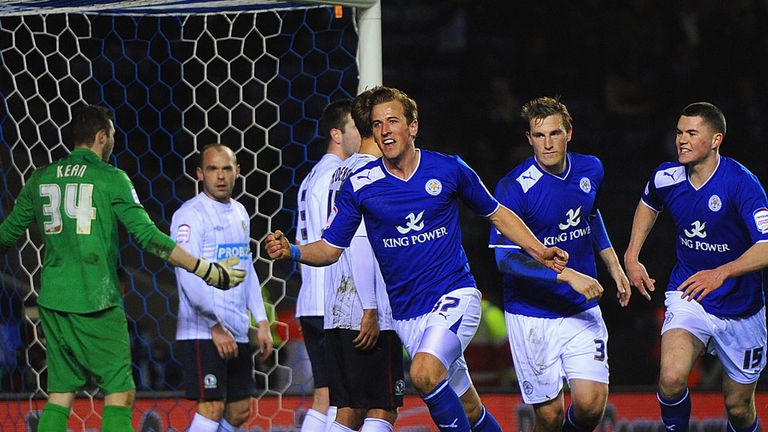With Harry Kane reaching 100 England caps in Tuesday’s Nations League game with Finland, Sky Sports sat down to speak to some of those who helped him get to the top of the game.
Kane reached his century nine years after his England debut in 2015 – but even that had come after a long journey to his breakthrough at Tottenham, following loan spells at Leyton Orient, Millwall, Norwich and Leicester.
Things weren’t always so rosy for a young Kane who, even with his now famous work ethic, did not always find goals as easy to come by. His two goals against Finland – his 67th and 68th goals for his country – show how his career has been turned upside down.
Here is the story of his tender years as a footballer, some of the difficulties he faced and how he would not let his self-belief waver on his journey to becoming both Tottenham and England’s all-time record goalscorer.
Watch Harry Kane: The Journey at 8pm and 10pm on Wednesday on Sky Sports Premier League.
Leyton Orient, League One, 2010/11
Games played: 18. Goals scored: 5.
Manager Russell Slade: “His move came about because of a relationship we developed with Tottenham and their backroom staff, in particular (assistant manager) Tim Sherwood and his team.
“Our training ground and Spurs’ old one were close together. Tim was very keen to get one or two of his young players out into first-team football, of which Harry fell into that category. Albeit he was only 17 at the time.
“He wanted to improve, learn and work, so he was prepared to go from the Premier League to a League One club to get some experience.
“Was he going to make a living in the game? Yes, he was. Did he have potential? Yes, he did. What level? He was going to make it at a decent level – but I couldn’t tell you at that stage if that would be top of the Premier League and at international level.
“He just constantly wanted to get better, learn and move his career forward. To be part of that, to be the manager who gave him his debut – yeah, I’m very proud of that.”
Striker Scott McGleish: “My first impression of Harry was he was a humble young kid who just wants to learn, not what you’d say a typical big-time Charlie coming from the Premier League.
“We got to a game at Rochdale, Spotland, which was one of the worst pitches. Harry just walked on and went ‘What’s this?’ We said ‘Welcome to League One!’
“One thing that really stood out about Harry was learning from everyone he could. With Harry, you can see now how he drops in, he didn’t always play up front with us back then either. He played the No 10 role as well, he’d ask questions, stay behind for extras, and would just work on his game.
“He was continually out on the training field, trying to get better and better. But out of our two Tottenham loanees, Tom Carroll or Harry Kane, who’s going to play for England the most times? I would’ve probably said Tom Carroll. Harry was quite slight back then.”
Fellow loanee Tom Carroll: “Men’s football is so different to playing in the reserves or U21s. It comes to the stage where we were both excited to go out. Harry being Harry, he’d believe he’d go out, score goals and then go back and play at Spurs.
“If it wasn’t his day, it wasn’t his day – he’d just get on with it and go again. He always backed himself, and that’s been a massive thing for him over the years.
“After a session, during finishing drills, you’d see him with McGleish and (Alex) Revell plucking their brains.”
Millwall, Championship, 2011/12
Games played: 27. Goals scored: 9.
Manager Kenny Jackett: “He was always a very talented goalscorer, and we’d seen him come through and make his way into senior football.
“How similar was he to Teddy Sheringham? His touch and awareness was good, but they were at different stages of their careers as when Teddy played for Millwall.
“Harry was very young at the time, and had to adapt and find different ways to get into the game.
“He could get into the pocket on the left-hand side and was very good at receiving the ball on his right and then playing and shooting forward.
“He was a real natural finisher, off either foot or with his head. He worked out he needed to be better in the air, and didn’t have the body strength that he does now.
“His timing then, and being able to draw a foul, he picked those up very quickly. They can get you into the game, and get you on the ball, get you chances.
“We were playing Doncaster away, he’s come inside and hit it and I’ve thought, ‘don’t shoot from that far out!’ from 35 yards – and he’s put it in. There was a little spell towards the end, Doncaster and Portsmouth away, where he got key goals. His form at the Den was fantastic.”
Midfielder Josh Wright: “He was someone you couldn’t get in from the training pitch, he’d always stay out and do extras and finishing. You’d look at the way he would strike a ball, and he always had something a little bit more than most.
“You could play it up to him, he’d hold it up, and the timing of his runs in behind – there’s him and Daniel Sturridge who I played with in my youth for England, they’re the two strikers who stand out. When I’d get the ball, they wouldn’t make their run too early or too late, it was inch-perfect.
“We didn’t know if he’d go back out on loan or get a chance at Spurs. The question was posed by one of us, how far do you think he could go? I think it got higher and higher as the season went on. We thought he’d be a Premier League footballer, how many games and what club – we weren’t sure, but we agreed there was a good chance he’d play for England.
“After he left, we stayed in touch and when he left Millwall and went back to Spurs, I noticed a difference. He looked leaner, more powerful and stronger. He said Spurs had worked with him, got hold of him, and they’d started to see the potential he had.”
Norwich, Premier League, 2012/13
Games played: 5. Games scored: 0.
Manager Chris Hughton: “I was looking to bring in a centre-forward. He was still developing, but he was a goalscorer and good with both feet.
“The difficulty we had with Harry was he got injured when he was with us. What he would do and other coaches would tell you is exactly the same, every day after training he would have a bag of balls and one of the coaches was with him, just doing finishing sessions.
“He would consistently find the corners, left foot, right foot. If you said to me in those days he would’ve become the celebrated player he is, I wasn’t sure. He was still developing at the time.
“This was a young player that, however big his progress was going to be, he had great confidence in his own ability and knew he was on an upward trajectory.
“The mindset I saw in him, the confidence, the desire to play and disappointment when he didn’t play; it’s about putting it all together – and he’s done that.”
Midfielder Robert Snodgrass: “It was a difficult time for him, which people don’t recognise because of how well he’s done everywhere and internationally.
“It’s important for any kid watching his journey, his story, it was a tough one for him. He was a great lad but I think he had a one-on-one in one of the games, and he missed it.
“When you’re a young lad coming in, those opportunities probably have to go for you. For us, it was a real eye-opener for us seeing him go out after training. It was so refreshing to see a young lad with that drive, wanting to be the best finisher and working on his game, even though his finishing was top quality.
“The coaches were amazing with him, he’d do 30 or 40 minutes every day. He was a really nice guy, always down to earth and chilled in terms of coming from a big club. He probably learned from it, but it was a challenging time for him at that point.”
Leicester, Championship, 2012/13
Games played: 15. Goals scored: 2.
Midfielder Danny Drinkwater: “One thing that surprised me, and a few of the lads would agree, we played an away game and weren’t doing too well at half-time, and he ended up speaking up in the dressing room – which was quite rare for a loan player. But the lads were impressed with it.
“He was practising shooting non-stop after training, and would ask goalkeepers if they could stay out so he could practice.
“If they couldn’t, if it was too close to a game day, he’d put a pole in the corner and try to hit it. His finishing now is unbelievable and has been for years. The footprints you put in at the start, they set you off.
“Harry would’ve had similarities with some of the players I came through with at Man Utd, and if not similarities then Harry would’ve been a notch ahead.
“One thing we noticed at Leicester, and he picked up himself, is he used to take quite a while to get his shot off. He liked to line his placement up a bit too precise, whereas now he gets a touch around the box and it’s one touch and finish. I don’t think the goalkeeper has a chance to set himself.
“I played against him quite a lot later in my career, and he sent everyone who he played with during his England career shirts and it was a great thing to do. I think I played four or five games with him internationally, I wasn’t a 50-cap player or anything but he thought about everyone.”
Defender Liam Moore: “He was a bit-part player for large spells of his time at Leicester. Fifteen or 20-minute cameos, I remember a period he came on at right mid or on the right of a three. There was no fuss from him, he just got on with it and scored a couple of goals.
“He was quiet, very quiet. He worked in the background, but had the focus to know what he wanted to do. He was a leader in a different kind of way; you get the screamers and shouters, but he was quite calm and calculated.
“I didn’t think either Jamie Vardy or Harry Kane would go on to play for England. But when he started making waves in the Premier League with Tottenham, we went to the U21 Euros that summer and the squad got announced with Harry in it.
“That’s already big news dropping down from the seniors, where he’d already made his debut and scored. We didn’t do well as a team in that tournament and got knocked out in the group but I just remember my impressions of him from it.
“There’s certain things in football which stick with you, and I just remember him coming back and thought he was a superstar. You could tell it there and then, he didn’t need anything – he just needed some balls and a goal and he was happy.
“Any young player wanting to make strides into the game should just get as much information about what Harry Kane did and that’ll give them the best chance.”













